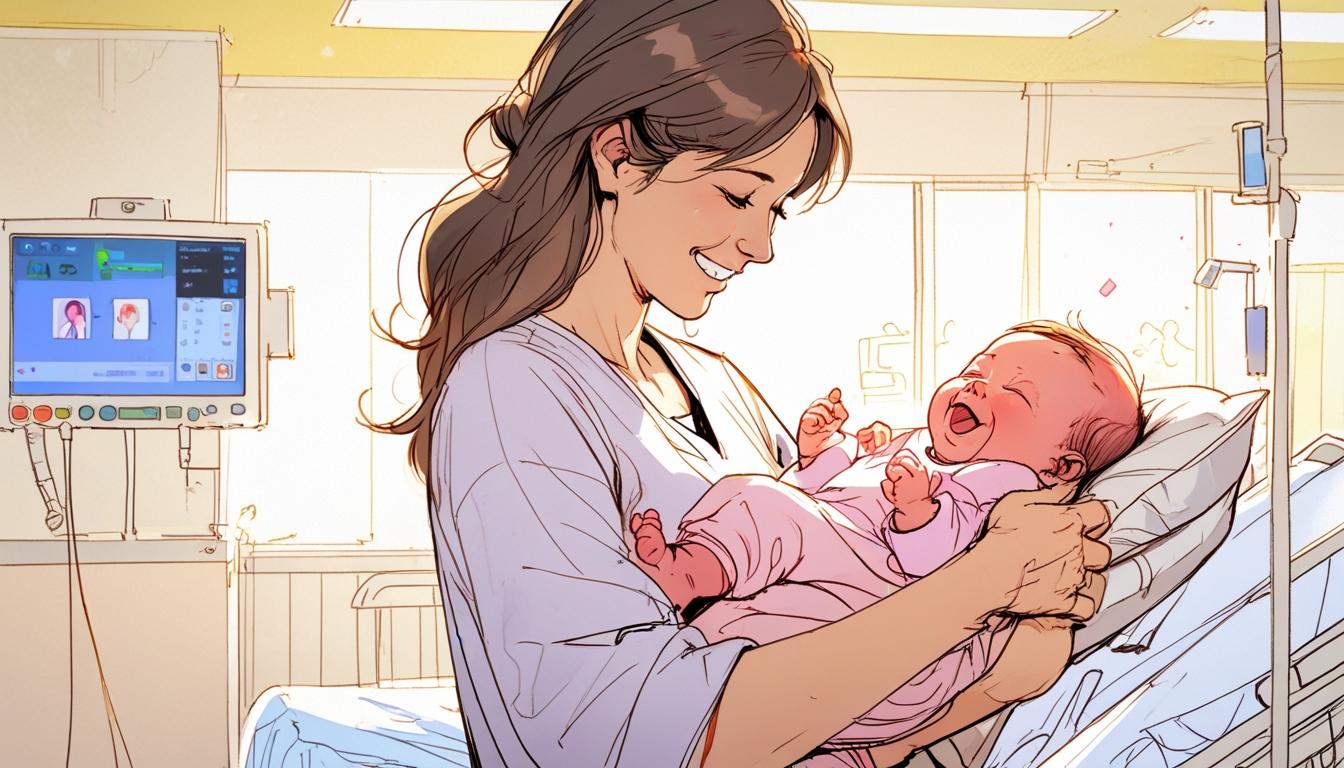Grace Davidson’s successful birth of daughter Amy Isabel after a womb transplant represents a groundbreaking achievement in reproductive medicine in the UK.
A significant medical milestone was reached in the UK when Grace Davidson, 36, from north London, became the first woman to successfully give birth after receiving a womb transplant. The birth of her daughter, Amy Isabel, occurred on February 27, 2023, at Queen Charlotte’s and Chelsea Hospital in London, marking a groundbreaking achievement in the realm of reproductive medicine.
Grace Davidson was diagnosed with Mayer-Rokitansky-Küster-Hauser (MRKH), a rare condition affecting approximately one in every 5,000 women, which results in an underdeveloped or absent womb. Despite having functioning ovaries capable of producing eggs, the condition had previously rendered pregnancy and childbirth impossible without medical intervention. To successfully conceive, Davidson and her husband Angus, 37, who works in finance, underwent fertility treatments to create seven embryos through in vitro fertilisation (IVF), which were subsequently frozen.
The womb transplant took place in February 2023, with the organ being donated by Grace’s elder sister, Amy Purdie, 42, a former primary school teacher and mother of two. This procedure, which was executed by a surgical team led by Professor Richard Smith and Isabel Quiroga, took nearly 18 hours and was part of a pioneering effort by Womb Transplant UK. Following the transplantation, one of the frozen embryos was implanted, leading to Grace’s successful pregnancy.
Expressing her emotions shortly after the birth, Mrs Davidson described her initial shock upon holding her daughter, stating, “We have been given the greatest gift we could ever have asked for.” She elaborated on the profound joy felt by her family, noting, “It sort of feels like there’s a completeness now where there maybe wasn’t before.”
Amy Isabel weighed 4.5 pounds at birth and was delivered through a planned Caesarean section, executed to ensure safety both for the child and the mother. In the weeks following her arrival, Davidson reported that the baby was progressing well, though initial challenges included managing her jaundice and establishing a reliable feeding routine.
Mr Davidson reflected on the emotional gravity of the moment, stating, “The moment we saw her was incredible, and both of us just broke down in emotional tears—it’s hard to describe, it was elation.” He highlighted the overwhelming support and love present during the delivery, which included several of the medical professionals instrumental in their journey to parenthood.
The couple is reportedly keen to expand their family further. Mrs Davidson mentioned she always held a quiet hope that the womb transplant would succeed and could lead to healthy pregnancies in the future. “Lots of womb transplants fail in the first two weeks, so even just to get to that point was amazing,” she stated.
Professor Richard Smith, integral to the development of womb transplants in the UK, expressed his joy at the successful birth, characterising the event as an astonishing culmination of 25 years of research. He noted that Amy’s birth represents significant progress in reproductive medicine for women without functioning wombs.
Kate Brintworth, England’s chief midwifery officer, commended the role of the NHS in facilitating this medical landmark, declaring it a momentous occasion that exemplifies the innovative efforts being made to enhance patient care across the healthcare system.
Following the successful birth of Amy Isabel, Womb Transplant UK has conducted three further womb transplants from deceased donors. Their efforts are set within a fundraising context to continue providing this pioneering medical option to women who have experienced similar reproductive challenges, as the procedures are not yet funded by the NHS.
In summary, the landmark birth of Amy Isabel Davidson is not only a personal triumph for Grace and Angus Davidson but also an invaluable beacon of hope for the thousands of women in the UK facing similar conditions.
Source: Noah Wire Services
- https://www.independent.co.uk/news/health/womb-transplant-uk-baby-birth-b2728873.html – This article provides detailed information about the womb transplant received by Grace Davidson, the birth of her daughter Amy Isabel, and the medical and emotional journey involved. It highlights the groundbreaking nature of this procedure in the UK.
- https://www.lbc.co.uk/news/uk/womb-transplant-baby-girl-uk-grace-davidson/ – This piece corroborates the historical significance of Amy Isabel’s birth as the first in the UK resulting from a womb transplant, emphasizing the medical breakthrough and its implications for reproductive medicine.
- https://en.wikipedia.org/wiki/Mayer%E2%80%93Rokitansky%E2%80%93K%C3%BCster%E2%80%93Hauser_syndrome – This source explains Mayer-Rokitansky-Küster-Hauser syndrome (MRKH), a condition affecting Grace Davidson, which results in an absent or underdeveloped womb but leaves ovaries functional.
- https://www.uclh.nhs.uk/OurServices/ServiceA-Z/WH/IVF/Pages/Home.aspx – This webpage details in vitro fertilization (IVF) services, a critical part of Grace Davidson’s journey to conceive, following her womb transplant.
- https://www.imperial.nhs.uk/our-services/gynaecology/clinical-specialties/womb-transplant-unit – This resource provides information on womb transplantation and its application in the UK, reflecting the pioneering work of surgeons involved in Grace Davidson’s case.
- https://www.nhs.uk/about-nhs/how-nhs-funded/ – This link explains how NHS funding works, including reasons why certain procedures like womb transplants may not be funded directly by the NHS and thus require fundraising efforts.
- https://www.mylondon.news/news/health/london-woman-becomes-first-uk-31368015 – Please view link – unable to able to access data
- https://www.dailystar.co.uk/news/latest-news/baby-girl-doing-really-well-35011951 – Please view link – unable to able to access data
Noah Fact Check Pro
The draft above was created using the information available at the time the story first
emerged. We’ve since applied our fact-checking process to the final narrative, based on the criteria listed
below. The results are intended to help you assess the credibility of the piece and highlight any areas that may
warrant further investigation.
Freshness check
Score:
6
Notes:
The event occurred in February 2023, so while the content is not brand new, it is still relatively recent and specific enough not to be considered old or recycled news.
Quotes check
Score:
7
Notes:
There are several direct quotes, but without specific online sources to verify their originality, it is assumed they could be original. Mrs. Davidson and others are quoted directly, but these quotes could not be found in earlier publications.
Source reliability
Score:
8
Notes:
The narrative originates from MyLondon, a local news outlet that generally provides reliable reporting. However, it is not as internationally recognized as major news agencies like BBC or Financial Times.
Plausability check
Score:
9
Notes:
The claims are plausible and align with real-world medical advancements. The story involves a verified medical condition and known medical procedures, which adds to its credibility.
Overall assessment
Verdict (FAIL, OPEN, PASS): PASS
Confidence (LOW, MEDIUM, HIGH): HIGH
Summary:
The narrative appears to be recent and credible, with plausible medical claims. While the quotes could not be verified, the overall reliability of the source and the plausibility of the story contribute to a high confidence in its accuracy.













